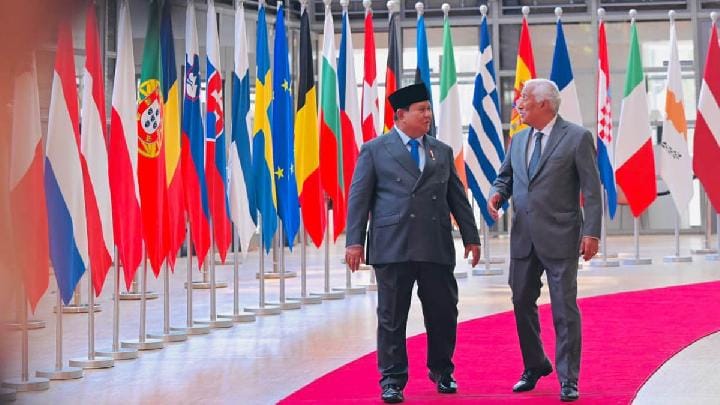TEMPO.CO, Jakarta – After nearly a decade of negotiation, Indonesia and the European Union (EU) are now preparing to ratify the Indonesia-European Union Comprehensive Economic Partnership Agreement (IEU-CEPA). The signing of this agreement is scheduled to take place in the third quarter of 2025 in Jakarta, marking a new phase in the economic cooperation between these two strategic partners.
The Coordinating Minister for Economic Affairs Airlangga Hartarto stated that all negotiation substances have been finalized. According to him, the negotiation process is now in the final stage of technical arrangements and ratification timing. Indonesian President Prabowo Subianto is scheduled to meet directly with European Commission President Ursula von der Leyen and European Council President Antnio Costa to discuss the finalization of IEU-CEPA during his visit to Brussels, Belgium.
“There will be a signing in the third quarter of this year in Jakarta. But we await the announcement from the President. So we do not, not spill any leaks,” Airlangga said in his official statement from Brussels, Belgium, on July 12, 2025.
Objectives of IEU-CEPA
As stated on the CEPA official page, IEU-CEPA is not just a free trade agreement, but also an economic partnership aimed at strengthening comprehensive economic relations between Indonesia and the European Union.
The main objectives of this agreement include:
1. Enhancing Market Access
IEU-CEPA will provide tariff exemptions for approximately 80 percent of Indonesian export products to the European Union market. This includes flagship commodities such as palm oil and its derivatives, copper ore, industrial fatty acids, footwear, as well as dregs and solid residues.
2. Enhancing National Competitiveness
With tariff exemptions and strengthened cooperation standards, Indonesian products are expected to be more competitive compared to competing countries such as Vietnam and Malaysia, which have already had free trade agreements with the European Union.
3. Enhancing Investment and Economic Cooperation
IEU-CEPA opens up broader economic cooperation opportunities, including in the fields of technology, vocational education, environmental sustainability, and green transformation.
4. Addressing Geopolitical Challenges
In the increasingly heated global situation, such as the potential 32 percent increase in import tariffs by the United States on Indonesian products, IEU-CEPA becomes an important strategy for market diversification for exports.
5. Strengthening Indonesia’s Position in the Region and Globally
Indonesia is viewed as the anchor of the ASEAN economy and a strategic partner of the European Union. Indonesia’s accession process to the Organisation for Economic Co-operation and Development (OECD) also strengthens its bargaining position in these negotiations.
Benefits for the Indonesian Economy
1. Potential for More than 50 Percent Increase in Exports
IEU-CEPA is estimated to increase Indonesia’s exports to Europe by more than 50 percent in the next 3-4 years. This represents significant economic growth opportunities, especially for the manufacturing and labor-intensive industries.
2. Consistent Trade Surplus
Indonesia continues to record a trade surplus with the European Union, amounting to USD 4.5 billion in 2024 and USD 2.33 billion in January-April 2025. With IEU-CEPA, it is believed that these figures will continue to increase.
3. Mitigating Risks from the US Market
In the context of the threat of tariffs from the United States, IEU-CEPA provides a way to redirect export focus to Europe. The Executive Director of Aprisindo, Yoseph Billie Dosiwoda, emphasized the importance of this agreement so that Indonesia does not lose out to neighboring countries such as Vietnam, which already have tariff-free access to Europe.
Eka Yudha Saputra and Ilona Estherina contributed to the writing of this article.
Editor’s Choice: Indonesia and EU Finalize CEPA with Zero Tariffs on Trade
Click here to get the latest news updates from Tempo on Google News
